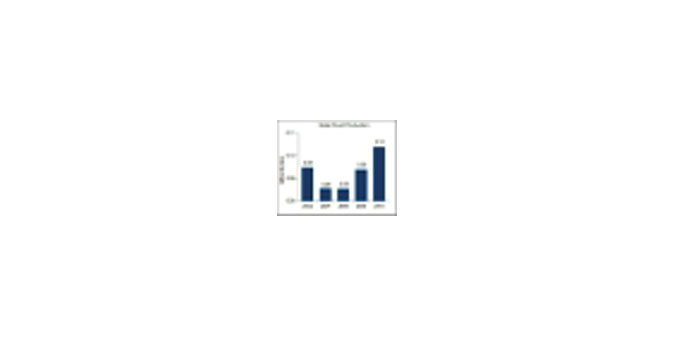|
|
Qatar’s food production industry accounts for only about 7% of the country’s domestic consumption, a new report said yesterday highlighting its dependence on food imports for local needs.
In 2010, Qatar produced 0.1mn tonnes of foods across categories, the GCC food industry report said yesterday.
“Qatar is an important business hub in the GCC. Qatar is more affluent compared to other member countries in GCC with the highest per capita income. With an enviable economic outlook and growing private consumption, food consumption in Qatar is forecast to grow at a compound annual growth rate (CAGR) of 5% up to 2017,” the report said.
In addition to strong macroeconomics, Qatar’s bid for the 2022 FIFA World Cup is likely to boost tourism activity in the country. This would translate into increased food consumption. Owing to the combined effect of these factors and higher domestic consumption, over the next decade, we expect Qatar’s food industry to continue growing at a pace faster than those of other GCC countries.
Cereal is the largest food category in the GCC, accounting for 46.3% of total consumption in 2010. Between 2012 and 2017, it is expected that cereal will remain the largest food category in the GCC region; its growth is likely to be subdued owing to rising demand for high-value products such as meat and dairy.
Cereal is the staple food in Qatar. During 2012-2017, it is expected that cereals and vegetables will remain the largest segments across food categories.
However, with rising affluence, there is an expected demand for high-value products such as milk, meat and fruits to outpace growth in other food categories. During this period, fruit and milk consumption is likely to grow at a CAGR of 6% and 5.5%, respectively, followed by vegetables (5.3%), meat (5.2%) and cereals (4.3%).
In 2008, the government established the Qatar National Food Security Programme to achieve food security. The programme aims to draw regional/international and non-governmental organisations to develop methodologies for best practices and optimal use of resources in the agricultural sector. Moreover, the government intends to formulate a Food Security Master Plan, which is expected to be completed by the end of 2014. This includes plans to establish an Agro-Industrial Park to promote food processing sector.
During 2011-12, Qatar invested $5.1bn toward its 10-year plan of becoming self-sufficient in the food sector. As part of its initiatives, Qatar leased about 400,000 hectares of land in Kenya against a $3.5bn loan to the Kenyan Government and had set up a $1bn joint venture with Vietnam to provide 90% of the funds for investment in various sectors, including agriculture.
In addition, Hassad Food Company, established by Qatar Holding in 2008, seeks to invest $629mn across several countries to meet the rising demand for food in Qatar. Recently, Hassad Foods acquired Bush Foods International in India for $100mn.
Over the last decade, the GCC fast food industry has grown at an astronomical rate, particularly in the UAE and Saudi Arabia. Various factors have contributed to this rapid growth, which includes rising affluence level, young population, urbanisation, hectic lifestyle and increasing participation in workforce.

